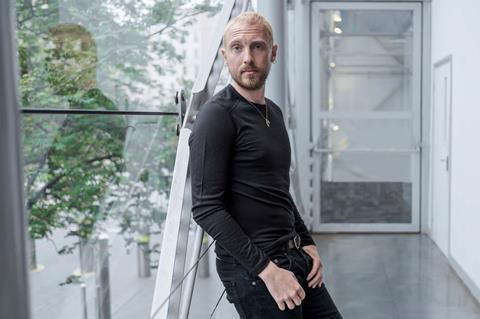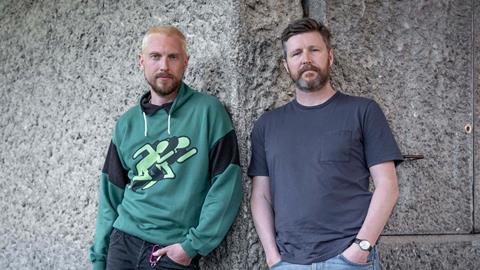Writer/director Andrew Haigh talks to actor/filmmaker Rory Fleck Byrne about bringing a queer perspective to his work, showing confidence and vulnerability on set, and how best to direct actors
Rory Fleck Byrne is an actor whose screen work — including, as he puts it, “fighting Jackie Chan in a forest” in Martin Campbell’s The Foreigner — did not necessarily cohere into a career that made sense to him, or to audiences. It all changed with his role as the boyfriend of Ben Whishaw’s character in 2022 BBC TV series This Is Going To Hurt, a project that arrived around the time he was also expressing himself as a filmmaker, via LGBTQ-flavoured debut short Dash. His next short is currently in post, while a third — with Whishaw attached in the lead role — will shoot next.
Andrew Haigh experienced his own transition, from assistant editor to director, making his feature debut with 2009 drama-documentary Greek Pete (about a London sex worker), then achieving a breakthrough in 2011 with low-budget gay love story Weekend. Two more features (45 Years and Lean On Pete) followed, plus Looking and The North Water for television. Haigh is currently putting the finishing touches to his next feature Strangers, starring Andrew Scott, Paul Mescal, Claire Foy and Jamie Bell, based on the 1987 novel by Japan’s Taichi Yamada.
Rory Fleck Byrne: You’re in post-production right now on Strangers. How do you juggle having things in development alongside being in the colour grade for a feature, and the stresses that come with that?
Andrew Haigh: Sometimes I deal with it well, and sometimes badly. You should ask my partner, he will give you a better answer. I have a lot of different projects bubbling away, so you have to find time for all of them.
Fleck Byrne: You once said there’s a lot of fear around this profession: as directors, there’s a pressure to seem like we know everything, and we aren’t vulnerable, because we are leading people. What’s your relationship to that fear now, so far into your career?
Haigh: I am happy to be vulnerable, especially with actors. With a crew, I feel like there is a sense that, even if you’re faking that confidence, you have to show it, because it can very easily crumble under the weight of all the anxieties that everyone is feeling. That is part of the job — if you can’t manage that, you’re in for a bumpy ride.
But that doesn’t mean being an arsehole. I feel like the more projects I do, it’s just trying to navigate balance, not let fear of the film’s reception drown everything else, or not let the amount of money that it’s costing affect it. So it’s just trying to work out what’s important, and also constantly going back to, “Why am I making this film? What’s the thing that’s making me dedicate my life to it?”
Fleck Byrne: During Covid, I moved back home to Ireland. I was 10 years out of drama school, and I didn’t feel like anything had established who I was as an artist. The roles I was getting didn’t express a lot of what I was curious about exploring. That led me to make my short film Dash — and then when that was finished, I didn’t know what to do, because it felt like a lot of my artistic self had poured into it. But then This Is Going To Hurtwas a huge opening of my heart in relation to being an actor. And those two things happened at the same time, and I feel like a paradigm shift happened. It was a very vulnerable time, but out of that a lot of fertility has blossomed, and I want to retain that as I move forward.
Haigh: There’s a lot of complex reasons why we want to make films. It’s like, are you trying to understand yourself through your films, or are you trying to be understood by others? I have asked myself those questions, like, am I just wanting to be loved by the world? If that’s the reason you’re making films, then you’re in the wrong job.
Fleck Byrne: You don’t strike me as that person.
Haigh: There’s definitely a shade of it. I can’t imagine there’s any queer kid that doesn’t want to be loved and accepted by the world.
Fleck Byrne: That’s why I went into it. Part of the awakening is that I’ve woken up to the fact that that’s not why I want to do it. And now I’ve realised why I want to do it.
Haigh: It also won’t happen. If you expect to be loved and accepted by the world, it won’t happen. Even when you do a film that’s successful, you think, “Okay, this is great, people like it, but I don’t know that I feel any better.” It’s important to remember you can’t wait for other people to accept you and love what you do.
Fleck Byrne: I am queer, and I grew up with an outsider’s perspective. Do you think that’s also where your empathy comes from?

Haigh: As a queer kid, you put yourself into other people’s shoes, you find your story in narratives that aren’t about you, and you can see yourself in those characters. I was obsessed by Nine To Five when I was a kid, and clearly I’m not Dolly Parton working in an office.
Fleck Byrne: How is the writing process for you, Andrew? Do you like a routine?
Haigh: I probably work better when I’ve got a deadline. If I’m spending a whole day writing, I usually write at home in the morning and then in a café in the afternoon. I need a little bit of noise to take some of the pressure off. Writing is hard. You get past the first draft and you feel like you can’t write and your work is terrible. You just have to keep working at it.
Fleck Byrne: What about the casting process?
Haigh: That’s the most exciting part, because you’re trying to put together the world of your story. I don’t like seeing too many people and don’t do big wide castings. I don’t like to audition actors, necessarily. I like to know how they feel about the work, and I want to know I can gel with them. And there’s also a reality to casting, especially as you go on in your career, and the films get a little bit bigger.
Fleck Byrne: You mean in relation to attracting bums on seats?
Haigh: It’s, “If you want to make this film, you need this. You cannot make this film with that person.” And it’s not just big movies, it’s indie movies as well. I’ve never cast anybody who I didn’t think was right. It’s always, they have to be right, as well as right for what’s needed for the production.
It’s complicated to get the right person — as you know, you’re an actor. Those relationships are vital, the relationship between director and actor — which is interesting for you, because you’re a director as well. Lots of actors make brilliant directors.
Fleck Byrne: That makes sense to me in relation to speaking to actors. Because when you’ve understood first-hand the vulnerability of being in front of a camera, you can quickly do the equation in your head of what might be needed to support that person.
Haigh: I’m always surprised about how nervous actors can be…
Fleck Byrne: People have a preconception about actors — they think they love attention and they want to sing and dance all the time. It couldn’t be further from the truth. Some of the best ones are the most introverted people.
Haigh: Even big successful actors are just as nervous on those first days of a shoot. It’s so important to remember that. I want them to know that I’m scared and they can be scared in front of me. Then you gain confidence together as you’re making the piece.
Fleck Byrne: You once said that whatever the actor’s performance is on the day, you like to stay working with that, as opposed to trying to project your view onto them.
Haigh: As long as you feel like you’re both on the same page about what you’re trying to express, then usually I found that the actor is giving me what I want. I see what I’m being given and then adjust by the smallest of margins.
Fleck Byrne: It’s funny having just directed a piece where I was giving my co-star a lot to think about, even though I know that’s bombarding people and it’s going to keep them in their head. So even someone who knows from experience can still make those kinds of mistakes.
Haigh: Sometimes the worst thing you can do is say anything, because something is coming up, and it just needs another take, and it’s going to get closer to the surface.
Fleck Byrne: What is the editing process for you? You edited Weekend yourself, and you’ve talked about, if you did something smaller in the future again, you may like to explore editing.
Haigh: It’s a hard process, editing. I think most directors, when they see the first cut of their film, they just want to cry. And it takes a long time, but editing is where the film is created. The bigger the film, the more notes you get, and the more you have to listen to people’s notes. But it’s always fascinating every day in the edit. It’s like, “Oh, we’ve changed one shot in the scene and now the whole scene feels completely different.”


























No comments yet